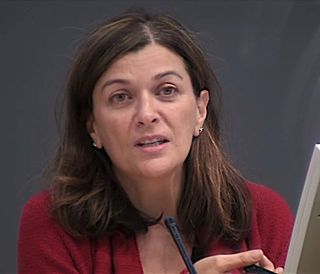
Macroeconomics is a branch of economics that deals with the performance, structure, behavior, and decision-making of an economy as a whole—for example, using interest rates, taxes, and government spending to regulate an economy's growth and stability. This includes regional, national, and global economies.

Post-Keynesian economics is a school of economic thought with its origins in The General Theory of John Maynard Keynes, with subsequent development influenced to a large degree by Michał Kalecki, Joan Robinson, Nicholas Kaldor, Sidney Weintraub, Paul Davidson, Piero Sraffa and Jan Kregel. Historian Robert Skidelsky argues that the post-Keynesian school has remained closest to the spirit of Keynes' original work. It is a heterodox approach to economics.

The Full Employment and Balanced Growth Act is an act of legislation by the United States government.

New Keynesian economics is a school of macroeconomics that strives to provide microeconomic foundations for Keynesian economics. It developed partly as a response to criticisms of Keynesian macroeconomics by adherents of new classical macroeconomics.

John Brian Taylor is the Mary and Robert Raymond Professor of Economics at Stanford University, and the George P. Shultz Senior Fellow in Economics at Stanford University's Hoover Institution.
Fiscalism is a term sometimes used to refer the economic theory that the government should rely on fiscal policy as the main instrument of macroeconomic policy. Fiscalism in this sense is contrasted with monetarism, which is associated with reliance on monetary policy. Fiscalists reject monetarism in a non-convertible floating rate system as inefficient if not also ineffective

Modern monetary theory or modern money theory (MMT) is a heterodox macroeconomic theory that describes currency as a public monopoly and unemployment as evidence that a currency monopolist is overly restricting the supply of the financial assets needed to pay taxes and satisfy savings desires. According to MMT, governments do not need to worry about accumulating debt since they can create new money by using fiscal policy in order to pay interest. MMT argues that the primary risk once the economy reaches full employment is inflation, which acts as the only constraint on spending. MMT also argues that inflation can be addressed by increasing taxes on everyone to reduce the spending capacity of the private sector.

The neoclassical synthesis (NCS), neoclassical–Keynesian synthesis, or just neo-Keynesianism was a neoclassical economics academic movement and paradigm in economics that worked towards reconciling the macroeconomic thought of John Maynard Keynes in his book The General Theory of Employment, Interest and Money (1936). It was formulated most notably by John Hicks (1937), Franco Modigliani (1944), and Paul Samuelson (1948), who dominated economics in the post-war period and formed the mainstream of macroeconomic thought in the 1950s, 60s, and 70s.

Paul Davidson is an American macroeconomist who has been one of the leading spokesmen of the American branch of the post-Keynesian school in economics. He is a prolific writer and has actively intervened in important debates on economic policy from a position critical of mainstream economics.

The Centre of Full Employment and Equity or CofFEE is an official research centre of the University of Newcastle, New South Wales, Australia, and has operated since 1998. CofFEE's membership is drawn from the disciplines of economics, politics, sociology and geography.

A job guarantee is an economic policy proposal that aims to provide a sustainable solution to inflation and unemployment. Its aim is to create full employment and price stability by having the state promise to hire unemployed workers as an employer of last resort (ELR).

Macroeconomic theory has its origins in the study of business cycles and monetary theory. In general, early theorists believed monetary factors could not affect real factors such as real output. John Maynard Keynes attacked some of these "classical" theories and produced a general theory that described the whole economy in terms of aggregates rather than individual, microeconomic parts. Attempting to explain unemployment and recessions, he noticed the tendency for people and businesses to hoard cash and avoid investment during a recession. He argued that this invalidated the assumptions of classical economists who thought that markets always clear, leaving no surplus of goods and no willing labor left idle.

William Francis Mitchell is a professor of economics at the University of Newcastle, New South Wales, Australia and Docent Professor of Global Political Economy at the University of Helsinki, Finland. He is one of the founding developers of modern monetary theory.

Larry Randall Wray is a professor of Economics at Bard College and Senior Scholar at the Levy Economics Institute. Previously, he was a professor at the University of Missouri–Kansas City in Kansas City, Missouri, USA, whose faculty he joined in August 1999, and a professor at the University of Denver, where he served from 1987 to 1999. He has served as a visiting professor at the University of Rome, Italy, the University of Paris, France, and the UNAM, in Mexico City. From 1994 to 1995 he was a Fulbright Scholar at the University of Bologna. From 2015 he is a Visiting professor at the University of Bergamo, located in Italy. He was a visiting professor at Masaryk University in the Czech Republic.
Full Employment Abandoned: Shifting Sands and Policy Failures is a book on macroeconomic issues written by economists Bill Mitchell and Joan Muysken and first published in 2008.

Stephanie A Kelton is an American heterodox economist and academic, and a leading proponent of Modern Monetary Theory. She served as an advisor to Bernie Sanders's 2016 presidential campaign and worked for the Senate Budget Committee under his chairmanship. She is also the author of The Deficit Myth, a New York Times bestseller, on the subject of Modern Monetary Theory.

Nicoletta Batini is an Italian economist, notable as a scholar of innovative monetary and fiscal policy practices. During the crisis she pioneered the IMF work exposing the dangers of excessive fiscal austerity and designed ways to consolidate public debt successfully during phases of financial deleveraging. Since 2003 at the International Monetary Fund, she has served as Advisor of the Bank of England’s Monetary Policy Committee between 2000-2003 and was Professor of Economics at the University of Surrey (2007-2012), and Director of the International Economics and Policy office of the Department of the Treasury of Italy’s Ministero dell’Economia e delle Finanze (MEF) between 2013-2015. Batini's fields of expertise include monetary policy, public finance, open economy macroeconomics, labor economics, energy and environmental economics, and economic modeling. She has handled extensive consultancy roles in the public sector in advanced and emerging market countries. She holds a Ph.D. in international finance from the Scuola Superiore S. Anna and a Ph.D. in monetary economics from the University of Oxford.

David I. Meiselman was an American economist. Among his contributions to the field of economics are his work on the term structure of interest rates, the foundation today of the implementation of monetary policy by major central banks, and his work with Milton Friedman on the impact of monetary policy on the performance of the economy and inflation.

Ourania "Rania" Antonopoulou a.k.a. Rania Antonopoulos is a Greek heterodox economist and Syriza politician. After the January 2015 election, MP Alexis Tsipras named her as the Greek Alternate Minister for Combating Unemployment in his cabinet tasked to implement a job guarantee policy based on her previous work experience and a specific study for Greece with other colleagues at the Levy Economics Institute. She remains a Syriza member. On the 5th of September 2018 she was appointed by the Greek Government as the Permanent Representative of Greece (Ambassador) to the OECD in Paris, France, entrusting her to represent the country despite the severe media attack she had been subjected to a few months earlier. Between February and August 2015, she also was a member of the Hellenic Parliament.
In economics, non-accelerating inflation buffer employment ratio (NAIBER) refers to a systemic proposal for an in-built inflation control mechanism devised by economists Bill Mitchell and Warren Mosler, and advocated by Modern Money Theory as replacement for NAIRU. The concept of NAIBER is related to the idea of a job guarantee aimed to create full employment and price stability, by having the state promise to hire unemployed workers as an employer of last resort (ELR).












